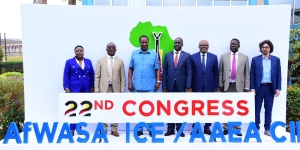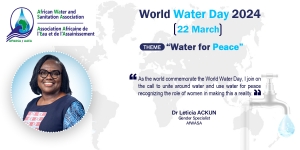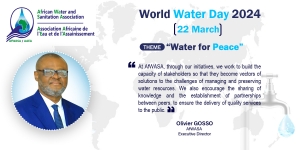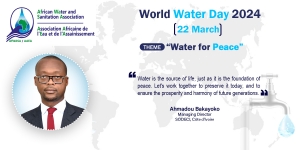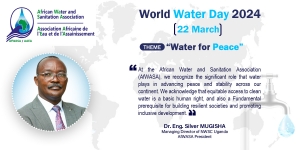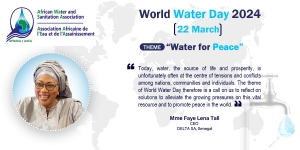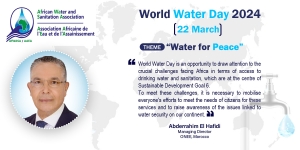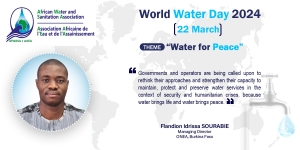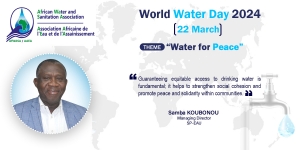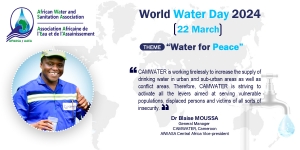Nzickonan Stéphanie
22nd AfWASA International Congress and Exhibition: launching ceremony held in Kampala, Uganda
The official launching ceremony of the 22nd AfWASA International Congress and Exhibition took place this Tuesday, March 26, 2024 in Kampala, Uganda.
The theme of the event, scheduled for February 16 to 20, 2025 at the Speke Resort Convention Centre, Munyonyo, is: Water and sanitation for all: a secure future for Africa. It will bring together around 4,000 water and sanitation stakeholders from various regions of the world to share experiences, exchange ideas and collaborate on best practices and policies for the growth of the sector.
Speaking at the launch, Dr Silver Mugisha, Managing Director of National Water and Sewerage Corporation (NWSC), the event's host, said the congress will be an opportunity to assess progress in access to water and sanitation services across the continent. It will also provide delegates with opportunities for networking and business partnerships.
For his part, AfWASA Executive Director, Mr. Olivier Gosso, expressed his gratitude to NWSC for agreeing to host the event for the 3rd time. He affirmed that this congress will be exceptional in terms of the number of participants, the scientific content and the progress Africa will have made in the water and sanitation sector, for the benefit of Africans.
It is worth noting that the 22nd AfWASA International Congress and Exhibition was originally scheduled for February 18-22, 2024 in the Republic of Guinea. However, for reasons of force majeure in Conakry, the Guinean capital, the congress was first postponed and then cancelled.
WWD 2024: Message from the Gender Specialist of AfWASA
As the world commemorate the World Water Day, I join on the call to unite around water and use water for peace recognizing the role of women in making this a reality. Being mindful of the fact that water is not only a resource to be used and competed over but also a human right there is the need to consciously involve women as major stakeholders to pave the way for a more harmonious society and the maintenance of peace.
WWD 2024: Message from the Executive Director of the African Water and Sanitation Association
On this significant day, 22 March 2024, the whole world celebrates World Water Day, with the theme "Water for Peace". Water, a vital resource, transcends borders and cultural differences, constituting an essential pillar for the survival of all forms of life on our planet. Unfortunately, it is often the subject of conflict and tension.
At AfWASA, through our initiatives, we work to build the capacity of stakeholders so that they become vectors of solutions to the challenges of managing and preserving water resources. We also encourage the sharing of knowledge and the establishment of partnerships between peers, to ensure the delivery of quality services to the public. We are convinced that this commitment will ensure equitable access to drinking water and promote sustainable management of this precious resource for future generations in Africa.
Happy World Water Day to everyone!
WWD 2024: Message from the Managing Director of Société de Distribution d'Eau de Côte d'Ivoire
Water is the source of life, just as it is the foundation of peace. Let's work together to preserve it today, and to ensure the prosperity and harmony of future generations.
WWD 2024 : Message from the President of AfWASA, Managing Director of National Water and Sewerage Corporation, Uganda
On this opportune occasion of World Water Day, I extend my heartfelt greetings to each one of you as we join hands to celebrate and reflect upon the Invaluable significance of sustainable Access to water and Sanitation to our livelihoods. As we unite under the theme "Water for Peace," we are reminded of the profound interconnection between access to water and the pursuit of global harmony. Water, indeed, is not merely a vital resource for sustaining life but also a catalyst for fostering social cohesion, Economic prosperity, and environmental sustainability.
At the African Water and Sanitation Association (AfWASA), we recognize the significant role that water plays in advancing peace and stability across Our continent. We acknowledge that equitable access to clean water is a basic human right, and also a fundamental prerequisite for building resilient societies and promoting inclusive development. As stewards of water resources, it is incumbent upon us to redouble our efforts and reaffirm our commitment to ensuring universal access to safe and reliable water services for all. Through collaborative partnerships, innovative solutions, and community engagement, we can address the challenges of water scarcity, pollution, and inadequate infrastructure.
Let us recommit ourselves to the noble cause of ensuring that every individual, regardless of their circumstances or location, has the basic human right to clean water and sanitation. Together, we can turn the tide of adversity into opportunity and pave the way for a brighter, more equitable future for generations to come.
I extend my deepest gratitude to each one of you for your firm dedication and tireless commitment to the noble mission of AfWASA. Let us seize this Momentous occasion to reaffirm our Collective resolve and take decisive action towards realizing our shared Vision of a world where every individual Can sustainably access safe water, and sanitation.
Thank you !
WWD 2024: Message from the Chief Executive Officier of DELTA SA
Today, water, the source of life and prosperity, is unfortunately often at the centre of tensions and conflicts among nations, communities and individuals. The theme of World Water Day therefore is a call on us to reflect on solutions to alleviate the growing pressures on this vital resource and to promote peace in the world. This reflection will lead us to explore various strategic points aimed at preventing water-related conflicts and promoting more equitable and sustainable management of this crucial resource for humanity.
-
A few points to help prevent water-related conflicts
-
Invite cross-border countries to conclude cooperation agreements on the shared management of water resources. According to a UN report, only 24 countries have concluded cooperation agreements for all their shared water resources.
-
Establish dialogue and diplomacy: That means encouraging dialogue between the stakeholders concerned, including governments, international organisations, NGOs and local communities, in order to resolve water-related conflicts through diplomacy and mediation.
-
Integrated water resources management: Adopting an integrated approach to water management, taking into account social, economic, environmental and political aspects in order to prevent tensions linked to water scarcity or poor water management. By way of illustration, we can cite the report on the MDGs 2022, where around two billion people do not have access to drinking water, which may be due to poor water management.
A few points to promote a more equitable and sustainable management of water resources
-
Conservation and protection of aquatic ecosystems: protecting aquatic ecosystems such as rivers, lakes and wetlands, which provide vital ecosystem services such as water purification and flow regulation, thereby contributing to the sustainability of water resources.
-
Protecting human rights to water and sanitation: guaranteeing universal access to drinking water and adequate sanitation by recognising water as a fundamental human right, in order to reduce inequalities and ensure security for all.
-
Limiting global warming: with the aim of reducing the increase in water stress, particularly water shortages.
By implementing these various strategic points, we can make progress towards more equitable, sustainable and peaceful management of water resources worldwide.
WWD 2024: Message from the Managing Director of Office National de l'Electricité et de l'Eau Potable, Morocco
World Water Day is an opportunity to draw attention to the crucial challenges facing Africa in terms of access to drinking water and sanitation, which are at the centre of Sustainable Development Goal 6.
To meet these challenges, it is necessary to mobilise everyone's efforts to meet the needs of citizens for these services and to raise awareness of the issues linked to water security on our continent.
WWD 2024: Message from the Managing Director of Office National de l'Eau et de l'Assainissement of Burkina Faso
Access to water and sanitation is a fundamental human right. Making this right effective everywhere and for everyone remains a major challenge, given that freshwater resources are very limited and must be used for a variety of purposes, from agriculture to energy production, industry and human consumption.
People's daily well-being depends to a large extent on access to drinking water and sustainable sanitation services. The preservation and strategic, integrated management of this precious resource is therefore essential, by all and for all, to ensure peace.
In addition to water-related conflicts between nations, many countries, including Burkina Faso, are having to cope with damage to their drinking water infrastructure, contrary to the principles of the "Geneva List of Principles for the Protection of Water Infrastructure" of July 2020.
For more than five years, Burkina Faso has been experiencing a deteriorating security situation, which has unfortunately affected water infrastructure and the quality of service provided to the population in certain areas.
In an unstable security context, the supply of drinking water and the provision of adequate sanitation services must remain key areas of intervention, because the survival of the populations affected, their dignity and the preservation of the social fabric depend on it.
As a result, governments and operators are being called upon to rethink their approaches and strengthen their capacity to maintain, protect and preserve water services in the context of security and humanitarian crises, because water brings life and water brings peace.
WWD 2024: Message from the Managing Director of Société de Patrimoine Eau et Assainissement of Togo
Guaranteeing equitable access to drinking water is fundamental; it helps to strengthen social cohesion and promote peace and solidarity within communities.
WWD 2024: Message from the Managing Director of Cameroon Water Utilities Corporation
The international community will this year celebrate the World Water Day under the theme “Water for Peace”. This theme challenges us in a particular and urgent way. In most of our countries, peace remains fragile. Moreover, social peace is a real commitment for drinking water soldiers that are water and sanitation utilities. Our daily lives are made up of many challenges that have to be overcome by African companies in charge of the distribution of drinking water and sanitation issues. Indeed, the supply of safe drinking water for the benefit of vulnerable groups is a factor of resilience and development in Africa in general and in Central Africa in particular, given the conflict-affected areas. These undermine the efforts made by our various Governments to increase the rate of access to safe drinking water in accordance with the Sustainable Development Goals (SDGs).
Aware of the challenges related to access to safe drinking water for the preservation of peace in general and social peace in particular, as well as its positive impact on survival and well-being of many refugees and internally displaced people arriving in Cameroon due to internal and external crises, the Cameroon Water Utilities Corporation (CAMWATER) has set to work resolutely, particularly in the border towns, with the support of the Government, bilateral and multilateral partners. In compliance with the instructions of H.E. Mr Paul BIYA, President of the Republic, reiterated in his message to the Nation on December 31, 2023, CAMWATER is working tirelessly to increase the supply of drinking water in urban and sub-urban areas as well as conflict areas. Therefore, CAMWATER is striving to activate all the levers aimed at serving vulnerable populations, displaced persons and victims of all sorts of insecurity. With the support of development partners and humanitarian agencies such as the International Committee of the Red Cross (ICRC), we have made significant investments to strengthen drinking water supply systems in the North west, South west and Far North Regions. These are direct impact projects to support these vulnerable populations and ensure peace. In 2024, CAMWATER will implement drinking water supply projects in the cities of Yaounde and Douala, given the massive presence of internally displaced persons as a result of the crisis in English-speaking regions.
Water for Peace is a perfect reflection of this holistic vision of peace and stability ensured by access to a vital need, necessary for the stability of our countries, our economies and fundamental to strengthen the resilience of communities affected by conflict.

 English
English  Français
Français 
